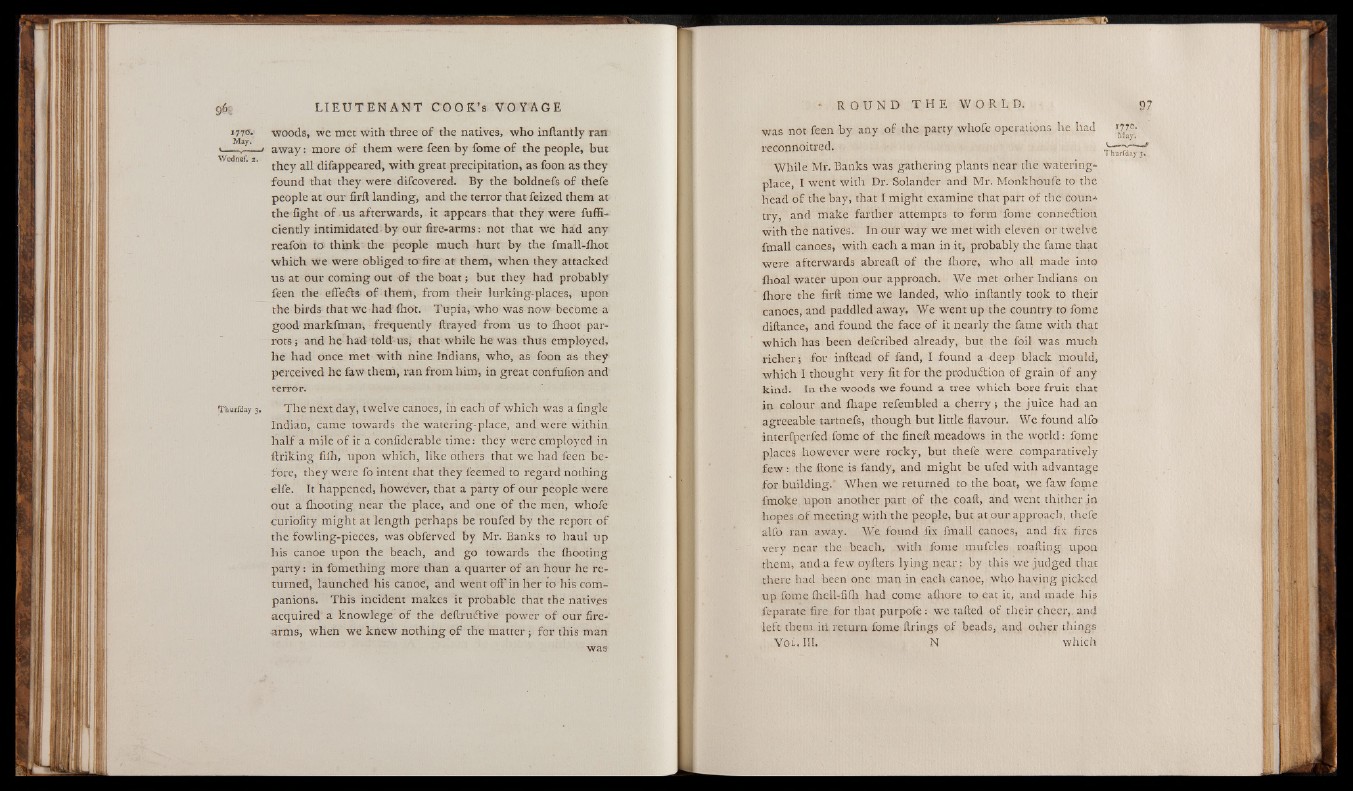
woods, we met with three of the natives, who inftantly ran
away: more of them were feen by fome of the people, but
they all difappeared, with great precipitation, as foon as they
found that they were difcovered. By the boldnefs of thefe
people at our firft landing, and the terror that feized them at
the fight of us afterwards, it appears that they were fuffi-
ciently intimidated-by our fire-arms: not that we had any
reafon to think the people much hurt by the fmall-foot
which We were obliged to fire at them, when they attacked
us at our coming out of the boat; but they had probably
feen the effefls of them, from their lurking-places, upon
the birds that we-had-foot. Tupia, who was now- become a
good markfman, frequently ftrayed from us to fhoot parrots
; and he had told us, that while he was thus employed,
he had once met with nine Indians, who, as foon as they
perceived he faw them, ran from him, in great confufion and
terror.
Thurfday 3. The next day, twelve canoes, in each of which was a Angle
Indian, came towards the watering-place, and were within
half a mile of it a confiderable time: they were employed in
linking fifo, upon which, like others that we had feen before,
they were fo intent that they feemed to regard nothing
elfe. It happened, however, that a party of our people were
out a {hooting near the place, and one Of the men, whofe
curiofity might at length perhaps be roufed by the report of
the fowling-pieces, was obferved by Mr. Banks to haul up
his canoe upon the beach, and go towards the {hooting
party: in fomething more than a quarter of an hour he returned,
launched his canoe, and went off in her to his companions.
This incident makes it probable that the natives
acquired a knowlege of the deftructive power of our firearms,
when we knew nothing of the matter; for this man
1770.
May.
was
was not feen by any of the party whofe operations he had
reconnoitred.
While Mr. Banks was gathering plants near the watering-
place, I went with Dr. Solander and Mr. Monkhoufe to the
head of the bay, that I might examine that part of the coun-*
try, and make farther attempts to form fome connection
with the natives. In our way we met with eleven or twelve
fmall canoes, with each a man in it, probably the fame that
were afterwards abreaft of the fhore, who all made into
fhoal water upon our approach. We met ocher Indians on
{hore the firft time we landed, who inftantly took to their
canoes, and paddled away. We went up the country to fome
diftance, and found the face of it nearly the fame with that
which has been defcribed already, but the foil was much
richer; for inftead of fand, I found a deep black mould,
which I thought very fit for the production of grain of any
kind. In the woods we found a tree which bore fruit that
in colour and lhape refembled a cherry; the juice had an
agreeable tartnefs, though but little flavour. We found alfo
interfperfed fome of the fineft meadows in the world: fome
places however were rocky, but thefe were comparatively
few : the ftone is fandy, and might be ufed with advantage
for building.’ When we returned to the boat, we faw fome
fmoke upon another part of the coaft, and went thither in
hopes of meeting with the people, but at our approach, thefe
alfo ran away. We found fix fmall canoes, and fix fires
very near the beach, with fome mufcles roafting upon
them, and a few oyfters lying near: by this we judged chat
there had been one man in each canoe, who having picked
up fome Ihell-fifh had come afoore to eat it, and made his
feparate fire for that purpofe: we tailed of their cheer,, and
left them in return fome firings of beads, and other things
Vol. III. N which
Thurfday 3»